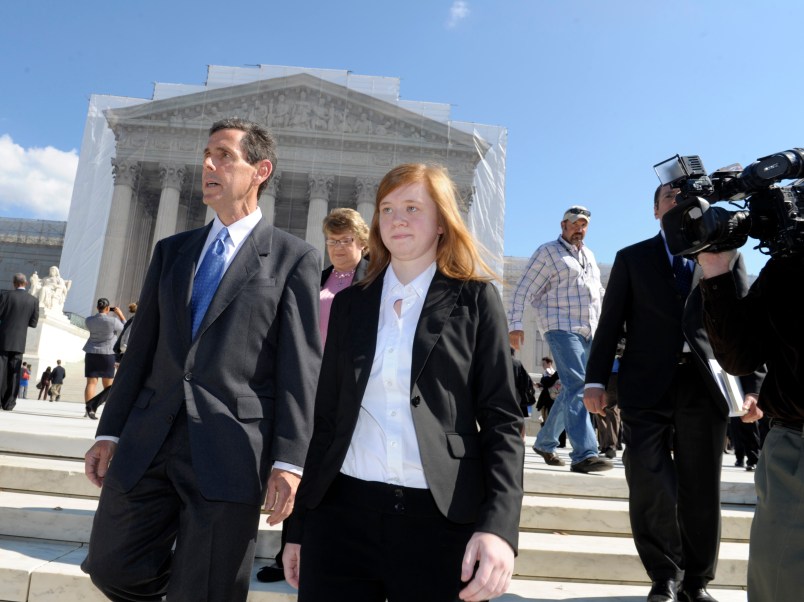The Supreme Court voted 4-3 to uphold University of Texas-Austin’s affirmative action program. The majority opinion released Monday was written by Justice Anthony Kennedy. He was joined by Justices Ruth Bader Ginsburg, Stephen Breyer and Sonia Sotomayor. Justice Clarence Thomas filed a dissenting opinion as did Justice Samuel Alito. Chief Justice John Roberts and Justice Thomas joined Alito’s dissent.
Justice Elena Kagan had recused herself from the case because she worked on it on behalf of the government when it was at the lower court level.
The case was a challenge to University of Texas-Austin’s affirmative action program brought by a white woman named Abbi Fisher, who was denied admission into the school in 2008. This term was the second time the Supreme Court heard arguments on the case, having previously sent it back to a lower court to review the program under a higher standard. Both times the appeals court upheld the University of Texas’ system.
Kennedy, in his opinion, said that Fisher had failed to prove that her denial of admission amounted to a violation of the Constitution’s Equal Protection clause, as she had claimed. He also said the university had a compelling interest in ensuring a level of racial diversity in the student body that enriched the educational experience.
Making the case complicated was that the university largely accepted students based on a race-blind program designed to increase diversity. Anyone who places in the top 10 percent of their high school ranking is automatically granted admissions, making up three-quarters of the school’s incoming class. Fisher was not in the top 10 percent of her high school class, so was seeking admission through the qualitative program that sorts out the university’s remaining applicants, where race can be one of many factors considered.
The majority opinion also said that even though the court upheld the program today, the university should continue to reassess it. “It is the University’s ongoing obligation to engage in constant deliberation and continued reflection regarding its admissions policies,” the opinion said.
Fisher’s case was spearheaded by Edward Blum, a conservative legal advocate who has a history of getting civil rights law and other policies designed to address racial discrimination in front of the Supreme Court.
Alito’s 50-page dissent was highly skeptical of the University of Texas-Austin’s defense of the program while bashing the majority’s decision as “remarkable—and remarkably wrong.”
“When UT decided to adopt its race-conscious plan, it had every reason to know that its plan would have to satisfy strict scrutiny and that this meant that it would
be its burden to show that the plan was narrowly tailored to serve compelling interests,” Alito wrote. “UT has failed to make that showing. By all rights, judgment should be entered in favor of petitioner.”
He said that the university was engaging in stereotypes by arguing that the top 10 percent plan was not enough to ensure the diversity is sought in its student body.
He said the university had failed to define “with any clarity” its interest in ensuring a racially diverse student body and had also not demonstrated how its current program achieved that goal.
He said the goals the university had articulated “are not concrete or
precise” and that they offer “no limiting principle for the use of
racial preferences.
“For instance, how will a court ever be able to determine whether stereotypes have been adequately destroyed? Or whether cross-racial understanding
has been adequately achieved?” Alito said.
He accused the school of paying “little attention to anything other than the number of minority students on its campus and in its classrooms” in its effort to increase diversity. He also said that courts had ignored the effect the program had on Asian-American students and had allowed the University of Texas-Austin to “pick and choose which racial and ethnic groups it would like to favor.”
Alito said the school depended on “few crude, overly simplistic
racial and ethnic categories,” and that it had designed an offering of courses that “ensures a lack of classroom diversity.”
Read the full opinion below:







Oh, what a difference it makes to have a SCOTUS that is not dominated by right wing blow hardship. This case only stands if and when the Democtatic candidate wins the Presidency.
Shocking, just shocking.
Zombie Scalia spun several times in his grave.
Thank the FSM.
The only thing she had to do was to be in the top 10% of her class. Not a tall order for somebody with her background. I hope this is the last time we hear from her.
While I agree we need to make sure Clinton is nominating justices after Jan. 20, 2017, if Kagen had not recused herself this would have been a 5-4 even if Scalia had not gone tits-up.